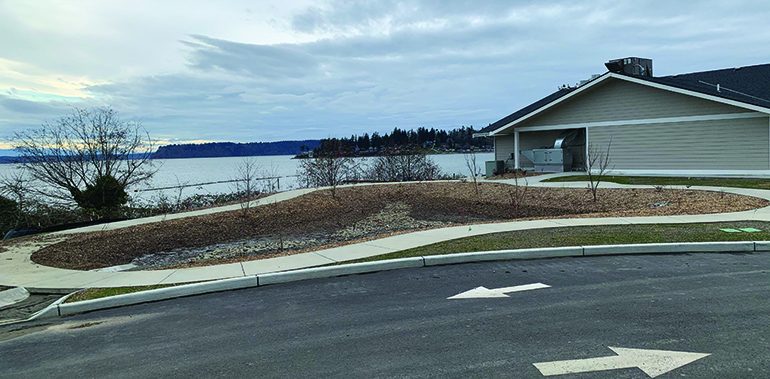
By Kalvin Valdillez, Tulalip News
Sometime during the night of March 9, a main water break occurred directly above the Tulalip Senior Center causing a water outage at the senior center, the senior apartments, as well as the entire Battle Creek neighborhood and all along Totem Beach Road. Water gushed into the newly extended parking lot and threatened damage to the recently remodeled senior center.
According to Tulalip Natural Resources, the pipe burst is believed to be caused by a combination of cold weather and frequent vehicle traffic over the pipeline. The line break proved to be an inconvenience to many surrounding residents and elders who rely on the waterline, as they went without water for the majority of the following day. However, the Senior Center, Tulalip Utilities, the Tribe’s Natural Resources Department, and most importantly local marine life, are a bit relieved in the fact that a bad situation didn’t take a turn for the worse thanks to an implementation of a natural filtration system to the senior center remodel.
“The rain garden saves the day!” exclaimed Valerie Streeter, Tulalip Natural Resources Storm Water Planner. “They said the water went underneath the pavement and some went into the storm drains, but it was too much. So then it went into the rain garden and the overflow was stopped by a silt fence that caught all the silt – the water and mud pulled out of the bank.”
By design, rain gardens collect storm water runoff from rooftops, nearby streets, lawns and driveways, absorbing and filtering out harmful pollutants like oil, metal, paint, pesticide, and fertilizer. Rain gardens effectively remove 90% of chemicals and 80% of sediments from storm water runoff, preventing those containments from entering our ecosystem, according to the Environmental Protection Agency.
“It would’ve been bad if that water would have made it to the bay,” Valerie said. “It’s kind of by luck that the burst happened there. But even before this incident, with all the rain we’ve been getting, the rain garden has been taking that water and managing it, acting like the sponge it needs to be, and sending that clean water out to the bay.”
Over recent years, the Tribe has taken proactive measures by building several rain gardens and bioretention swales throughout the reservation, including at the Tribal Administration building parking lot and along busy roads. Throughout the senior center’s remodel planning stages, the rain garden was said to be a touchy subject and debated if it was an immediate necessity. Thankfully the decision to include it in the first phase of renovations proved to be, in hindsight, beneficial to the fish and aquatic life who frequent the waters of the bay.
Valerie explained, “If you want healthy fish and good water, not just marginal water, you want that water to go through the plants and the soil because that’s what naturally happens; it goes through the soil, cleans it, makes organic carbon and heads out, and then you’ll have water that really supports fish.”
“A lot of the pollution is car related,” she continued. “There’s zinc on the tires, and zinc is a heavy metal that will kill either fish or their food. And then you have copper in the brake pads, and that affects the smell of the salmon. The salmon use their sense of smell to find their way back to the home stream, and if they see a predator they secrete this chemical and the other fish smell it and sink down in the water to the avoid the predator. You add copper, even a little bit above the baseline of it, it doesn’t work. The other fish don’t get the message, they don’t sink down and the predator eats them. And then you also have the oil drips that coats gills and eggs so they don’t get oxygen.
So the sediment, had the rain garden or the silt fence not have been there today, and that waterline breaks, it would’ve gone into the building and the bay. It probably would’ve smothered things. If it had been a stream or where salmon eggs were, all that sediment would cover it and then you couldn’t have that oxygen exchange and the eggs would die. It would clog the gills of anything living out there.”
In addition to preventing irreversible harm to the waterways, salmon and aquatic creatures inhabiting Tulalip Bay, the rain garden also lent a helping hand to the Utilities and Public Works departments by gathering all the excess water from the burst, allowing the crew to quickly work on fixing the busted pipe and reconnecting the waterline for the community. Unfortunately, the water break did cause damage to the center’s parking lot, but the recently remodeled building did not receive any large water damage from the burst.
Although in its infancy stage, the native plants still have yet to be planted, the rain garden came through in a big way for Tulalip by halting mass pollution to the bay. Valerie believes that once complete, the garden will be a beautiful and purposeful addition to the senior center.
“It’s going to be really pretty once it’s planted,” she expressed. “The other idea is they’re going to have a bench so the elders can sit, relax and enjoy the rain garden. There will be all kinds of birds and animals that come to visit. Benches, berries, the bay and a beautiful landscape that’s functional for the environment. That sounds like a wonderful scenery.”